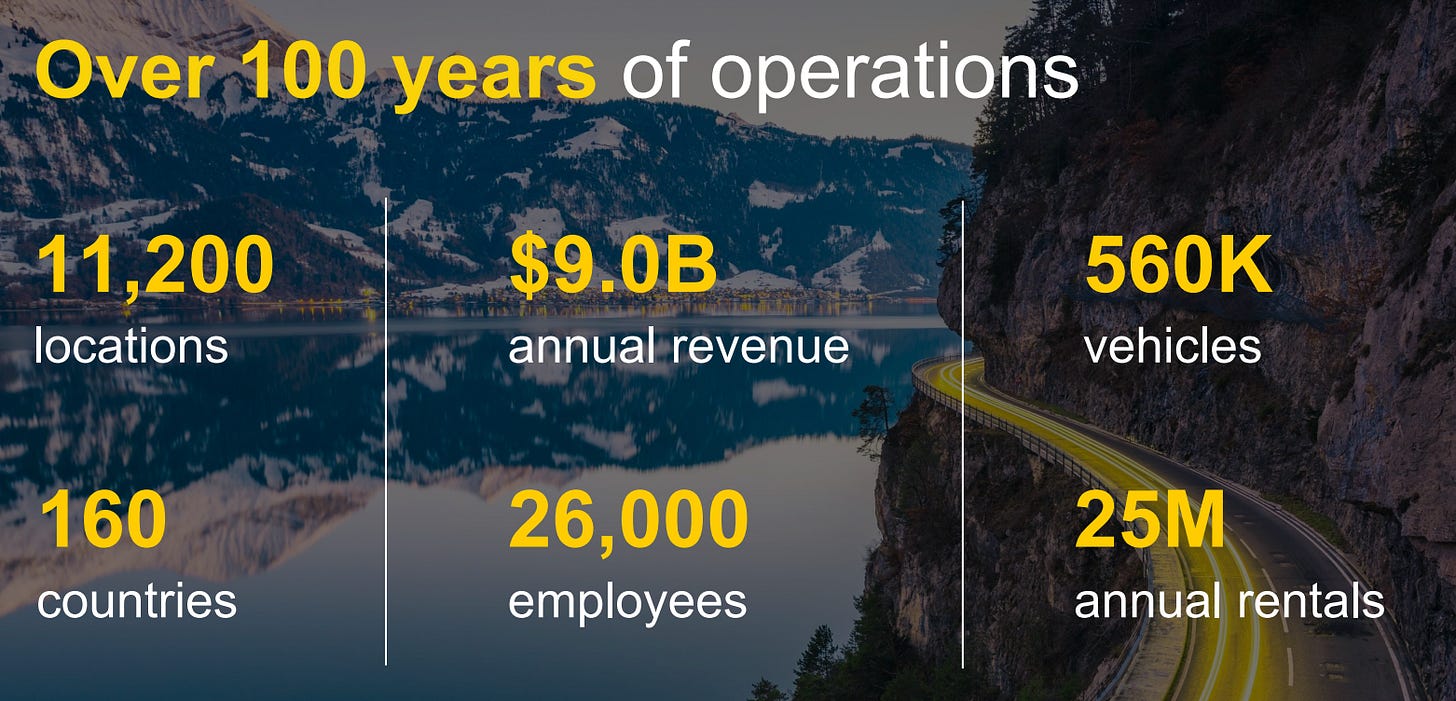The Hertz ($HTZ) Capital Stack: Ackman’s Next Great Trade or Next Great Workout?
2026 maturities, covenant cliffs, and distressed unsecureds—credit investors are watching closely.
🚨 Connect with me on Twitter / Instagram / Threads / Bluesky | Estimated Read Time: 17 Minutes
The rental car business isn’t complicated. Buy cars. Rent them out. Sell them before they’re worthless.
Yet somehow, Hertz has turned this simple formula into advanced calculus. And now Ackman thinks he has the solution.
Remember 2021? When Hertz made that splashy Tesla order and everyone thought they were geniuses? Their most recent financials tell the harsh reality: a staggering $2.9 billion loss for the year as they frantically unloaded overpriced EVs at massive discounts.
Here’s what nobody wants to admit: Hertz’s EV experiment wasn’t visionary, it was expensive wishful thinking. The company’s bet on EVs, particularly Teslas, cost them billions as residual values plummeted. They’re still digging out from the wreckage, with no immediate path to profitability in sight.
But the script may have just changed. CNBC revealed yesterday Bill Ackman’s Pershing Square had quietly built a massive 19.8% stake in the company, sending the stock soaring 56% in a single day. After quietly accumulating shares with an SEC exemption that delayed disclosure, Ackman has positioned himself as Hertz’s second-largest shareholder.
Is this just another activist investor targeting a vulnerable company, or does the billionaire have a genuine turnaround plan? With the rental car industry fundamentally sound but Hertz still struggling with the aftermath of its EV adventure, the stage is set for either a legendary comeback story or another expensive lesson.
The real question? Can Ackman’s financial engineering skills fix what is fundamentally an operational disaster? Hertz’s problems run deeper than balance sheet gymnastics: they’re about fleet management, utilization rates, and rebuilding customer trust.
The debt markets have responded enthusiastically to the news, but they’re still pricing in substantial risk. The next 12 months will be make-or-break.
And creditors will be watching very, very carefully.
I. Situation Overview:
Hertz is a 100-year-old company that somehow managed to botch the most straightforward business model in travel: buy cars, rent them out, sell before they break down. It’s not complicated.
Their footprint is massive: 11,200 locations across 160 countries. They’ve got the premium brand (Hertz), the budget brands (Dollar and Thrifty), and the bargain-basement option (Firefly). Airport locations bring in 66% of revenue, off-airport the other 34%. The infrastructure is there. The brand recognition is there.
So how did they lose $2.9 BILLION in 2024?
One word: Tesla.
Fresh out of bankruptcy in 2021, management decided what Hertz really needed was a splashy 100,000-vehicle EV order. Wall Street loved it. Tesla’s stock surged. Everyone celebrated. Hertz was “disrupting” the rental car industry!
Then reality intervened.
EV repairs cost TWICE what gasoline cars do. Customer demand underwhelmed. The charging network proved inadequate. And then Tesla itself started slashing prices aggressively, demolishing the residual values Hertz had built into their financial models.
By 4Q’24, they were dumping EVs and taking substantial losses just to get these assets off their books. Meanwhile, they’ve been frantically replacing 60% of their entire fleet, burning through cash at an alarming rate.
The problems aren’t just operational. They’re facing serious legal and debt challenges too:
Pre-bankruptcy bondholders want $320+ million in make-whole payments stemming from its 2020 bankruptcy case
Warrant holders are suing for another $187.5 million
Their debt covenants tighten dramatically from 4.75x to 3.50x leverage by mid-2025
2026 maturities are approaching rapidly
Enter Bill Ackman, the hedge fund strategist.
On April 16, 2025, Ackman’s Pershing Square revealed a massive 19.8% stake, sending the stock up 56% in one day. He received special SEC permission to delay disclosure while accumulating shares - a classic Ackman approach.
The debt markets reacted with surprising enthusiasm. Their secured notes jumped from 87 to ~97 cents on the dollar. The unsecured notes due 2026 surged from the 60s to ~80 cents. This dramatic repricing suggests that bondholders see Ackman’s involvement as a meaningful narrative driver.



